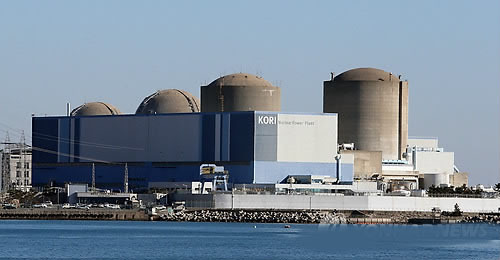Korea likely to raise electricity bill as it retires nuclear reactors: sources
By Catherine ChungPublished : June 22, 2017 - 12:08
South Korea is poised to follow Germany and Japan in raising power rates as it retires old nuclear power reactors and makes a switch to eco-friendly renewable energy, industry sources said Thursday.
South Korea shut down its oldest Gori-1 nuclear power plant in the southeastern port city of Busan Monday as the newly launched liberal Moon Jae-in administration has pledged to close aged nuclear reactors and coal-fired power plants. The move is popular with many people and environmentalists but has raised worries of high electricity bills and even power shortages going forward.
Moon's election campaign also includes scrapping the ongoing projects to build six new nuclear power plants and the shutting down of several aged nuclear plants including the Wolsong No. 1 Reactor with a lifespan that has been extended to 2022 after its initial 30-year cycle ended in 2012.
South Korea has 23 nuclear reactors in operation, generating about 30 percent of the country's total power supply.
The chief executive has, in addition, ordered the temporary shutdown of several aged thermal power plants and pledged to permanently close 10 aged coal power plants during his single five-year term in a rare case of shutting down nuclear and coal power plants concurrently around the world.
South Korea shut down its oldest Gori-1 nuclear power plant in the southeastern port city of Busan Monday as the newly launched liberal Moon Jae-in administration has pledged to close aged nuclear reactors and coal-fired power plants. The move is popular with many people and environmentalists but has raised worries of high electricity bills and even power shortages going forward.
Moon's election campaign also includes scrapping the ongoing projects to build six new nuclear power plants and the shutting down of several aged nuclear plants including the Wolsong No. 1 Reactor with a lifespan that has been extended to 2022 after its initial 30-year cycle ended in 2012.
South Korea has 23 nuclear reactors in operation, generating about 30 percent of the country's total power supply.
The chief executive has, in addition, ordered the temporary shutdown of several aged thermal power plants and pledged to permanently close 10 aged coal power plants during his single five-year term in a rare case of shutting down nuclear and coal power plants concurrently around the world.

The Moon administration, however, has yet to come up with comprehensive measures to make up for the expected power production shortfalls caused by the shutdown of the nuclear and thermal power plants.
The government is expected to raise the rates for the electricity used in the industrial sector, an industry source said.
"The government needs to present mid- and long-term plans for power rates before implementing its new energy policy," another energy sector expert said. "At issue is how to deal with the rising burden on industries."
Germany and Japan increased power rates by about 20 percent in the past years, according to data by the Ministry of Trade, Industry and Energy obtained by Rep. Choi Yeon-hye of the main opposition Liberty Korea Party.
Germany raised the price of electricity for residential use to 295 euros in 2015 from 244 euros per megawatt-hour in 2010.
The country suspended the operation of eight aged nuclear power plants in 2011.
Power rates for industrial use also rose 25 percent to 149 euros from 119 euros during the same time span.
Germany closed eight aged nuclear reactors immediately after the meltdown of the Fukushima nuclear power plant off Japan's east coast caused by a devastating earthquake and ensuing tsunami in 2011.
The European country has also decided to shut down nine more nuclear reactors between 2021 and 2022.
The ratio of nuclear power generation in Germany fell to 14 percent in 2015 from 22 percent in 2010.
Japan dropped the percentage of nuclear power drastically to 0.3 in 2015 from 26 percent in 2010.
The island nation increased coal power and LNG plants drastically to compensate for the power shortages while raising electric rates for the residential sector by 19 percent to 24.21 yen per kWh in 2015 from 20.37 yen in 2010.
The rates for industrial use jumped 29 percent to 17.65 yen in 2015 from 13.65 yen in 2010.
Amid growing complaints linked to power rate hikes and burgeoning trade deficit triggered by the need to import more fossil fuel, the Japanese government recently said it is moving toward restarting its nuclear power plants. (Yonhap)









![[Hello India] Hyundai Motor vows to boost 'clean mobility' in India](http://res.heraldm.com/phpwas/restmb_idxmake.php?idx=644&simg=/content/image/2024/04/25/20240425050672_0.jpg&u=)








